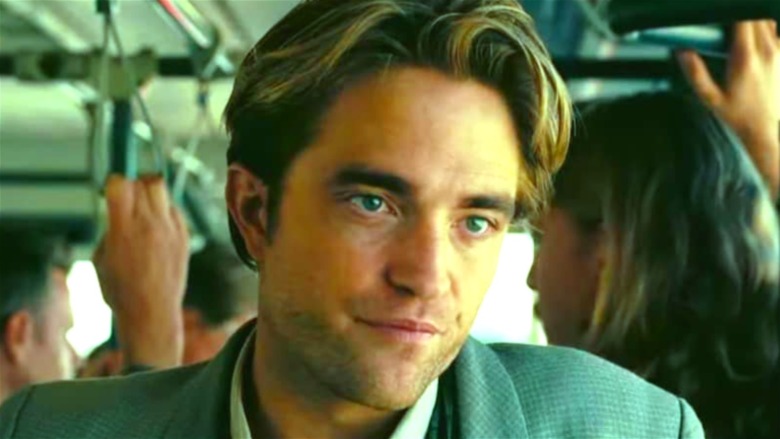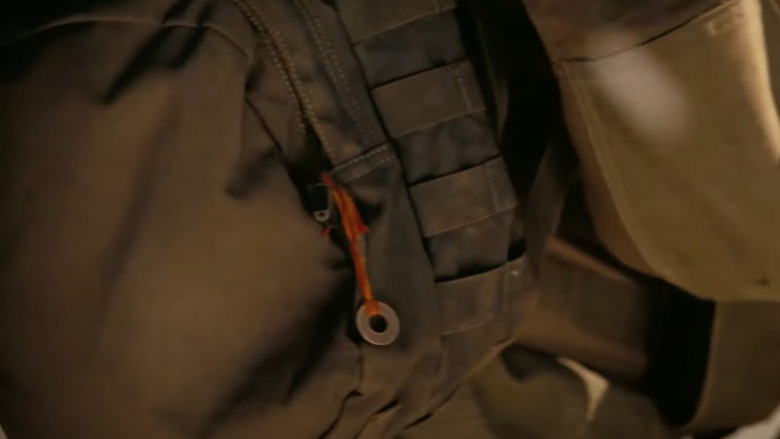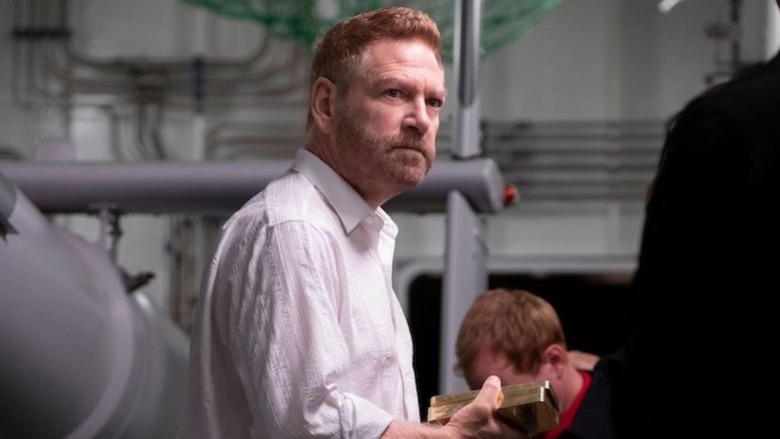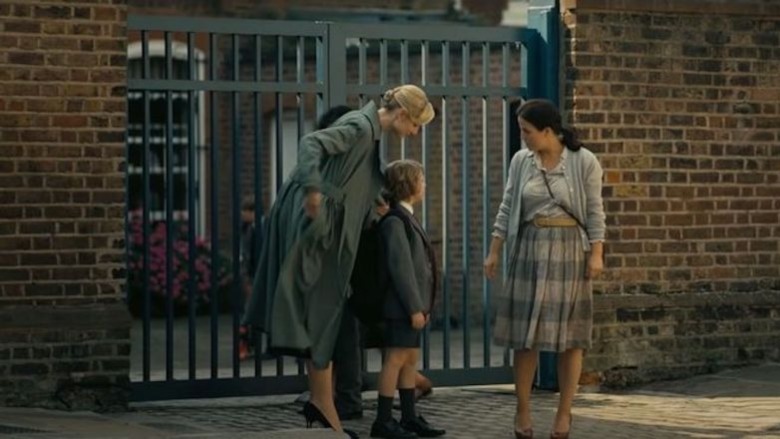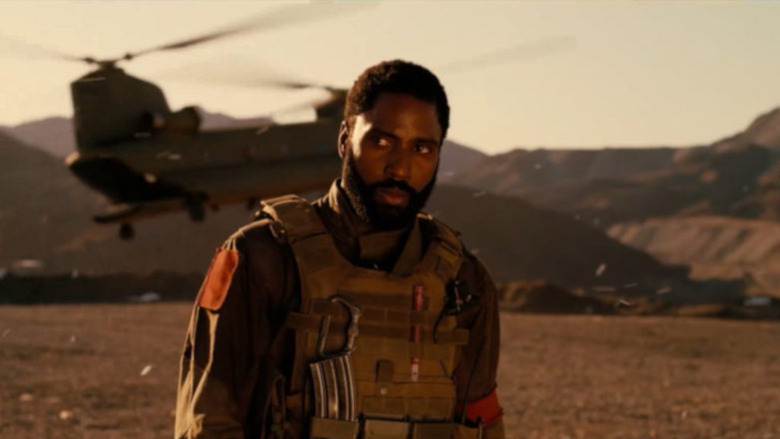Things You Only Notice In Tenet After Watching It More Than Once
Oh, Christopher Nolan. He clearly loves wrapping his stories up in complex double meanings and hidden details for audiences to spend hours unpacking and poring over, doesn't he? And Tenet is no different. In fact, it's quite possibly the most Christopher Nolan film that Christopher Nolan has ever directed. His previous works like Memento and Inception play with time and nonlinear storytelling, but Tenet pushes those ideas even further in a complicated web of entropy and espionage.
It follows John David Washington's unnamed "Protagonist" as he joins the mysterious organization of Tenet and becomes a key figure in trying to stop an apocalypse kick-started by people in a far-flung future. He's let in on a secret that certain technology allows Tenet agents to "invert" themselves, working backward through time. It's not technically time travel, but it sort of is. See? It's complicated already. Anyway, because of all the complicated science fiction elements to the film, there's a number of fascinating things you might pick up on in repeat viewings.
Red String
The opening attack on the opera is one of the key parts of the film, mainly because it's the event which pulls the Protagonist into the organization after being saved by an unknown gunman using inverted bullets to attack the terrorists. As the masked figure runs away, Nolan briefly pauses on some kind of totem to his backpack with a red-and-orange string. That same string is seen on the dead Tenet agent who sacrifices himself to unlock the door, so the Protagonist can stop the Algorithm.
It's only in Tenet's ending that the significance becomes apparent as Neil (Robert Pattinson) is seen wearing the red string on his backpack. It makes the moment when he walks away from the Protagonist to carry on the mission that will ultimately lead to his death all the more poignant. Because of how complex Tenet is with various characters being inverted at different points in time and the overall bizarre nature of the plot itself, it's easy to miss the string detail at the start. But essentially, Neil and the Protagonist's first mission together is also their last, as Pattinson's agent reveals that he was recruited into Tenet by the Protagonist himself. It's the start (and end) of a beautiful friendship.
Sator Square
Tenet pulls from a number of different scientific concepts in its story about the planet's entropy being inverted and reversing. One such idea it cherry-picks from is the Sator Square, which features a number of palindromic words that can be read both forward and backward. From top to bottom, the square features the words SATOR, AREPO, TENET, OPERA, ROTAS. And scattered throughout the story are direct references to the square, most obviously with the title of the film and the Tenet organization that is at the center of it all no matter which angle or timeline you look at it from.
One of the more obvious allusions to the square comes from Kenneth Branagh's slightly over-the-top villain, Andrei Sator, who bought a fake Goya painting from a forger named Thomas Arepo that his wife Kat had authenticated under false pretenses. Then, the first scene of the film throws the audience and the Protagonist right into an action-packed gun fight at the opera, while later on we see the security company at the Freeport (which stores art for collectors) is called Rotas.
Sator and Tenet are the only words that really have a huge dramatic impact on the story, but all these puzzle pieces left by Nolan are clearly meant to get our brains turning about the "mechanics of the universe," as Neil himself puts it.
Is Neil saving his own mother?
There's been a whole array of outlandish theories that have spun out of Tenet, like the ones suggesting it exists in the same worlds as Inception and Interstellar with Neil being the son of Cobb (Leonardo DiCaprio)... The less we say about that one, the better. Not everything needs to be the MCU! But there's clearly so much more to Neil than meets the eye, particularly because he's had a whole espionage career that we haven't seen (or have yet to see in the eyes of the Protagonist). And it's possible his whole motivation throughout the film is to keep his own mother safe.
The idea stems from the fact that Elizabeth Debicki's Kat Barton is blond with a well-spoken English accent and is determined to keep her young son Max safe throughout all the inverted craziness. When Neil is nursing Kat after she's been shot by an inverted bullet, there's a moment of quietness where he genuinely seems to care for her. Per Vulture, some fans suggested that Max's full name might be Maximilien, which when spelled backward is Neilimixam... Neil.
There's some heavy legwork to be done in making that work, especially since Neil would have to go through the turnstile and live plenty of time in reverse to wind up in the present day when the events of the film take place. It's unlikely, but it would add to the mystery of Nolan's love for nonlinear storytelling.
The whole film is pointless
Don't get angry! But Tenet is technically pointless. If the people in the future (who are bitter about living in an inhospitable world) had succeeded in their plan to reverse the planet's entropy and kill all life as we know it, the events of the film wouldn't have happened in the first place. But it's mainly pointless due to the Grandfather Paradox. If you're not familiar with the idea, it basically suggests that a person wouldn't be able to go back in time and kill their grandfather because the time traveler would then cease to exist, meaning they couldn't travel back in the first place.
So, by that logic, the future enemies couldn't reverse the entropy of the world and kill everyone because then they wouldn't be around to enact their plot in their present. So they were always destined to fail. It's possible that they know this, and they're just doing it all to be bitter and teach the past a lesson for ruining the planet. But then there would be no real outcome at all. Time travel is complicated, and so is Tenet.
But as Clemence Posey's mysterious scientist tells the protagonist: "Don't try to understand it. Feel it."
